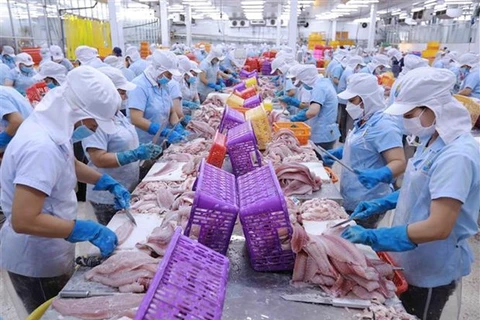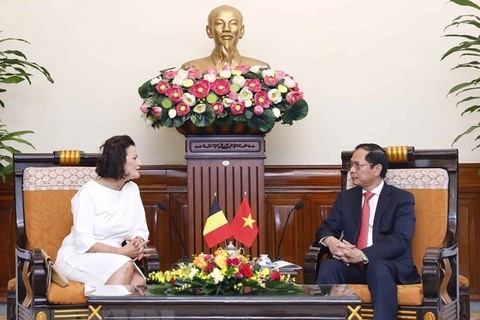 The EU-Vietnam Free Trade Agreement (EVFTA) has helped accelerate the recovery of Vietnam’s exports to the EU. (Photo: VNA)
The EU-Vietnam Free Trade Agreement (EVFTA) has helped accelerate the recovery of Vietnam’s exports to the EU. (Photo: VNA) The institute organised a workshop in Hanoi to announce the report reviewing the three-year implementation of the EVFTA within the framework of the Macroeconomic Reforms/Green Growth Programme implemented by the Deutsche Gesellschaft für Internationale Zusammenarbeit (GIZ) GmbH on behalf of the German Federal Ministry for Economic Cooperation and Development (BMZ)
Nguyen Anh Duong, head of the CIEM’s General Research Department, said the deal’s declining influence on Vietnam’s exports is possibly due to economic difficulties globally and in the EU in particular.
The decline has been seen even more clearly in Vietnam’s imports from the EU, he continued.
However, with many tariff incentives and the removal of barriers to market entry in various fields, the EVFTA has made it easier for EU investors to access and expand investments in the Southeast Asian nation, he noted.
The EU’s investments in Vietnam have increased after the COVID-19 pandemic, with the Netherlands, France, Luxembourg, Germany, Denmark, and Belgium being the biggest investors from the bloc to Vietnam, Duong went on.
At the same time, the pact has played a role in promoting institutional reform, he said, adding that such fields as trade, investment, intellectual property, sustainable development, financial services, and public procurement have seen many adjustments in institutions and legal documents.
Duong stressed that the EVFTA is expected to create momentum for Vietnam to perfect institutional capacity to satisfy requirements of the new situation.
According to the official, the report sets out specific recommendations, including reviewing and consolidating legal documents during the implementation of the agreement to fulfill Vietnam’s commitments, enhancing coordination from the central to grassroots levels, stepping up the communications work to popularise the EVFTA among businesses, especially small- and medium-sized enterprises, further improving the investment environment, and raising the competitiveness of businesses and the whole economy.
Ministries and agencies should conduct reforms, increase trade promotion activities, and review and simplify regulations and procedures in granting certificates of origin to exporters, Duong said./.
Duong stressed that the EVFTA is expected to create momentum for Vietnam to perfect institutional capacity to satisfy requirements of the new situation.
According to the official, the report sets out specific recommendations, including reviewing and consolidating legal documents during the implementation of the agreement to fulfill Vietnam’s commitments, enhancing coordination from the central to grassroots levels, stepping up the communications work to popularise the EVFTA among businesses, especially small- and medium-sized enterprises, further improving the investment environment, and raising the competitiveness of businesses and the whole economy.
Ministries and agencies should conduct reforms, increase trade promotion activities, and review and simplify regulations and procedures in granting certificates of origin to exporters, Duong said./.
VNA























